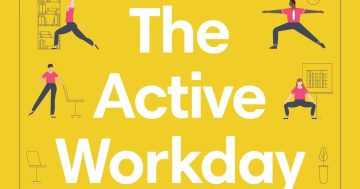Dan Schawbel* says in the wake of the pandemic’s ‘new normal’ we need to let go of thinking of work-time and home-time as being two distinct blocks.
 There’s no question that people are spending more time with their employer (albeit virtually) and thinking about work more than ever before.
There’s no question that people are spending more time with their employer (albeit virtually) and thinking about work more than ever before.
Part of this is because so many of our normal activities fell away during COVID-19, from social events and vacations to everyday activities like going out to eat.
We’re also generally working more hours, working different hours, and working nights and weekends.
Even before the pandemic, remote work had begun to blur the boundaries between work and life.
While this ‘always-on’ mentality is nothing new, it’s much more prevalent now that so many of us are working remotely.
Because of these shifts, work has become a much more significant part of people’s lives and therefore identities.
Despite concerns about burnout and overwork, people generally prefer having flexible hours because it allows them to optimise their workday around individual preferences and needs.
However, some may be asking: “How much do I really want my employer to be in my life?”
So let’s talk about where we’re headed in this space. What should you expect from your employer as we move toward the ‘new normal’?
Most workplace experts agree it’s time to shatter the idea of work-life balance — going forth, it will be all about work-life integration.
We need to let go of the mental model of thinking of work-time and home-time as being distinct and separate blocks.
Whether we like it or not, our managers and co-workers have become a much more integral part of our lives.
This not just because we’re all working more hours, but also because we can actually see each other’s lives through video conferencing
Our homes, our partners, our children, and our pets are all on view.
I think we can all agree that while there are pros and cons, the overall direction is positive.
When managers and employees see each other as the well-rounded and multi-faceted individuals they are, both parties benefit.
This not only creates more empathy, cohesion, and team support, it also inspires discretionary effort.
Not only are we looking to one another for support during the pandemic, we’re also looking to our employers to help us hold onto our identities — what we believe in, and what we’re willing to fight for.
Many of us are working more hours yet engaging in fewer non-work activities, which means we’re spending more time at work and we’ve had more free time to reflect on our purpose in life.
As a result, employees are finding that they attach more of their identities to their employer, and they want their organisations to espouse their own values more so than ever before.
US research shows nearly two-thirds of employees say that COVID-19 has caused them to reflect on their purpose in life, and nearly half are reconsidering the kind of work they do because of the pandemic.
The study concluded: “People who live their purpose at work are more productive than people who don’t.
They are also healthier, more resilient, and more likely to stay at the company.”
In order to ensure future business success and maintain a robust talent pipeline, leaders can’t just talk about their organisation’s purpose — they need to take action to align their organisation with the values that matter most to employees.
This could mean incorporating social or environmental goals into business operations, giving employees opportunities to support these efforts.
While work-life integration has its benefits, there are some aspects of this that can feel intrusive.
Again, US research shows that 80 per cent of organisations now monitor workers, as employees continue to work remotely.
For example, one of the world’s biggest call centre companies has announced that it will monitor thousands of staff by webcams to check whether they are eating, looking at their phones, or leaving their desks while working from home.
Over the past year, it’s likely that your employer has become a much more integral part of your life.
You may feel a deeper sense of connection with your colleagues, or you may find that you now look to your organisation to help define your life’s purpose.
For better or for worse, the trend toward greater work-life integration is sure to continue in the future, even if you plan on returning to the office.
*Dan Schawbel is a bestselling author and Managing Partner of Workplace Intelligence, a research and advisory firm helping HR adapt to trends, drive performance and prepare for the future.
This article is part of his Workplace Intelligence Weekly series.











